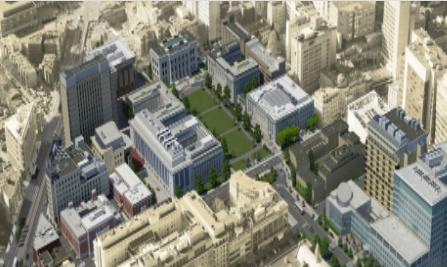Dean for Medical Education

Harvard Medical School Boston, MA



Harvard Medical School Boston, MA

Harvard Medical School (HMS) invites applications and nominations for the position of Dean for Medical Education (DME). This is an extraordinary opportunity to make impactful contributions to an institution at the forefront of medical education and to play a direct role in shaping the next generation of leaders in clinical care and biomedical inquiry.

Reporting to the Dean of the Faculty of Medicine, the DME leads all aspects of the Program in Medical Education (PME), providing strategic vision, oversight, planning, and implementation, and ensuring the highest standards of excellence for medical education. This individual will bring to the role a visionary, empowering, and collaborative ethos backed by a distinguished academic career.
As a contributing member of the Dean’s Leadership Council, the DME partners with colleagues at HMS, Harvard University, and HMS-affiliated hospitals to advance the school’s dedication to alleviating suffering and improving health and well-being for all; and champions the PME mission: to prepare a diverse group of students to become the next generation of leaders in all domains of medicine, and to prepare them for a commitment to lifelong learning necessary to stay abreast of the ever-expanding scope of scientific and medical knowledge.
This highly visible role requires successful experience working across key internal and external constituencies while exemplifying the highest standards of the medical profession, including a commitment to excellence, transparency, compassion, and fostering the values of diversity, inclusion, and equity at the core of HMS’ mission.
This is a time of unique opportunity for the next DME. While continuing to enhance HMS’ signature Pathways curriculum, this individual will have the opportunity to:
• Lead the school in the creation of a new curriculum for the Harvard-MIT Health Sciences and Technology (HST) program
• Shape a new clerkship model currently under development
• Explore a potential new track for students dedicated to health care leadership and transformation
• Ensure support for teaching faculty through a “core teaching faculty” model in collaboration with hospital affiliates, while maintaining exposure of HMS students to the traditional faculty role models who have inspired them for generations, supporting the intrinsic role of all faculty to teach
Harvard Medical School (HMS) is the graduate medical school of Harvard University and is located in the heart of the Longwood Medical Area of Boston, Massachusetts, surrounded by some of the world’s leading clinical and biomedical research institutions. Since its founding in 1782, HMS has continually expanded the boundaries of knowledge in an effort to understand life, cure and prevent disease, and reduce the burden of human illness through preparing generations of physicians, scientists, humanists, and leaders in every area that touches human health. The largest and most diverse clinical and research enterprise in the nation, HMS students, trainees, faculty, staff, and administrators are shaping the fields of science and medicine across the globe. Members of the HMS community bring unique and highly valued perspectives, talents, experiences, and contributions. Their dedication, expertise, and compassion are the foundational drivers of excellence in education, research, clinical care, and service.
At the center of teaching and learning is the HMS Quadrangle, known as the Quad. In addition to classrooms and amphitheaters where graduate and postgraduate students gain leading-edge knowledge, the Quad houses laboratories and offices for nearly 200 tenured and tenure-track faculty members in basic and social science departments, and a number of core research facilities. It also houses the offices of the dean of the faculty of medicine and the senior administrative leadership team.
Teaching and research at HMS extends beyond the Quad to world-renowned academic medical centers and research institutes across Greater Boston. Unlike many medical schools, HMS does not own or operate hospitals and relies instead on agreements with 15 affiliates. These hospitals and research institutes are vital partners that provide training and employ more than 12,000 physicians and scientists with HMS faculty appointments.

Leadership at HMS is overseen by the dean of the faculty of medicine supported by a team of deans, officers, and department heads. The Dean’s Leadership Council convenes bimonthly and serves as a cabinet for decision making and long-range planning.
George Q. MD, PhD Dean of the Faculty of MedicineGeorge Q. Daley, a world-renowned physician-scientist and educator, and longtime member of the HMS faculty, became the School’s 22nd dean in January 2017.
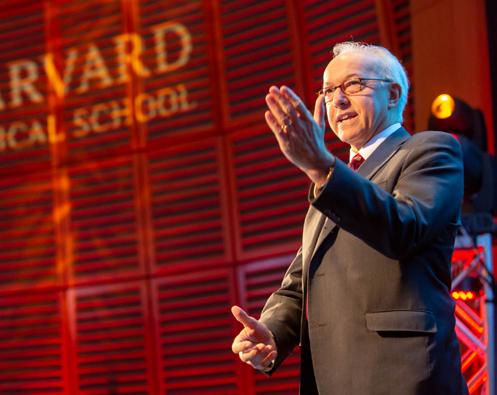
Internationally recognized for his leadership in stem cell science and cancer biology, Dean Daley’s work spans the fields of basic science and clinical medicine. Bringing the perspective of having worked with the School’s affiliated hospitals and research institutes, he knows firsthand the vital role that the HMS community plays in shaping the future of biomedical science and education at a time of transformative change.
A graduate of Harvard College and HMS with a PhD in biology from the Massachusetts Institute of Technology, Dean Daley also serves as the Caroline Shields Walker Professor of Medicine at HMS, and Professor of Biological Chemistry and Molecular Pharmacology at Boston Children’s Hospital.
Daley,
“By pursuing groundbreaking research aimed at understanding and curing human disease, by providing compassionate care, and by training the next generation of leaders in medicine and science, HMS rededicated itself to the essential work of ensuring that leading-edge health care is available to all.”
— HMS Dean’s Report 2022 (Read Here)
Harvard Medical School’s institutional priorities reinforce the School’s overarching strategic plan and reflect a shared commitment to its mission, community values, and diversity statement. The pillars of teaching and learning, discovery and scholarship, and service and leadership are advanced through a commitment to innovation and excellence, crossinstitutional collaboration, technology and process improvement, and fiscal discipline. Importantly, these pillars are strengthened by the School’s dedication to building a culture of diversity, inclusion, integrity, and empowerment. These underpinnings extend HMS’ local, national, and global impact as a force for good in the world.

HMS strives to cultivate an environment of inclusiveness and collaboration among students, trainees, faculty, and staff and to create new avenues for discussion that will advance the improvement
•
of health. The Office for Diversity Inclusion and Community Partnership offers a number of equity and social justice resources while driving key initiatives in this area.
The Office of Recruitment and Multicultural Affairs (ORMA) in the Program in Medical Education (PME) focuses on the recruitment and support of medical students who are from groups historically underrepresented in medicine and those who identify as LGBTQ. This initiative has resulted in more than 1,450 graduates who are Black, African American, Latinx, or Native American over the past 50 years. In 2011, ORMA began serving LGBTQ students and continues to lead the way in inclusive support for this student population across the nation.
To nurture a diverse, inclusive community dedicated to alleviating suffering and improving health and well-being for all through excellence in teaching and learning, discovery and scholarship, and service and leadership.
HMS aspires to excellence through a commitment to our community values of: collaboration and service, diversity and respect, integrity and accountability, lifelong learning, and wellness and balance.
Since Harvard Medical School’s establishment in 1782, its faculty have improved human health by innovating in their roles as physicians, teachers, researchers, and scholars. They have piloted educational models, developed new curricula to address emerging needs in health care, and developed thousands of leaders and compassionate caregivers who, through their passion and expertise, continue to shape the fields of medicine and science throughout the world.
In addition to leading in medical education, faculty have excelled in scientific discovery, achieving paradigmshifting “firsts” since 1799, when HMS Professor Benjamin Waterhouse introduced the smallpox vaccine to the United States. Today, the Faculty of Medicine includes more than 12,000 individuals working to expand the boundaries of knowledge in classrooms, clinics, and labs.
Each year, HMS selects 165 students from a pool of 8000+ applicants for its MD program, which comprises two curricular tracks, its signature Pathways curriculum and the Health Sciences & Technology (HST) program, an interdisciplinary curriculum focused on translational medical science and engineering.
Additionally, 35 first-year dental students study the foundations of medicine with HMS students. (Harvard School of Dental Medicine was the first in the U.S. to be connected with a university and its medical school and to confer the DMD degree.)
In addition to the MD degree and the DMD degree offered through the dental school, HMS offers master’s and PhD degree programs (interfaculty programs with the Graduate School of Arts & Sciences); postgraduate medical education programs; advanced online courses for professionals in health care, life sciences, and related fields; as well as customized corporate learning programs for emerging and established companies.
HMS’ Program in Medical Education (PME) extends learning beyond the classroom to prestigious, Harvardaffiliated academic medical centers and health
Total students: MD 702 | PhD 914 | MDPhD 192, basic sciences 162, social sciences 30 (total included in MD and PhD counts) | DMD 143 | master’s 569 (520 HMS, 49 HSDM) | DMSc 33 | Trainees (residents and postdoctoral fellows) 9,166
Total faculty: 12,311 | Tenured and tenure-track faculty on campus in 11 preclinical departments 198 | Voting faculty on campus and at affiliates 6,579 | Full-time faculty on campus and at affiliates 10,243
Nobel Prizes: Physiology or Medicine (cumulative) 10, Peace 16 recipients | National Academy of Sciences members (current) 89 | National Academy of Medicine members (current) 171 | Howard Hughes Medical Institute (current) 36 (35 Investigators, 1 Professor)
MD applicants: 6,914 | Admitted 226 (3.3%) | MD entering 2022 164 (includes 14 MD-PhD) Men 69 (42%) | Women 92 (56%) | Different identity 3 (>2%) | Underrepresented in medicine (Black or African American, Mexican American, Native American, Native Hawaiian or other Pacific Islander, other Hispanic) 33 (20%) | Asian 77 (47%)
Entering 2022: PhD 159 | DMD 35 | master’s 320 (305 HMS, 15 HSDM) | DMSc 8 | Additional combined degree programs: MD-MAD, MD-MMSc, MD-MBA, MD-MPH, MD-MPP
Medical school living alumni: 11,041 (MD and master’s)
As of September 2022
networks who are vital partners in clinical training. Faculty who serve as academic leaders at Beth Israel Deaconess Medical Center, Boston Children’s Hospital, Brigham and Women’s Hospital, Cambridge Health Alliance, and Massachusetts General Hospital not only teach medical students, but also 9,166 trainees, including residents and postdoctoral fellows. These trainees include interns, residents, clinical fellows, and postdoctoral fellows.
The current Pathways MD curriculum was launched in 2015 after an intensive three-year planning process involving large numbers of faculty, students, and staff who engaged in a bottom-up curriculum and pedagogical reform initiative. In addition to a complete overhaul of the content, structure, and pedagogy of the preclerkship curriculum, the Pathways reform frameshifted the Principal Clinical Experience (PCE) from the third to the second year.
The earlier completion of the year-long PCE allowed for creation of new Advanced Integrated Science Courses (AISCs) that are now a highlight of the postPCE phase. These courses range in subject area from cancer biology, immunology, genetics, pharmacology, and neurobiology to computationally-enabled medicine, translational bioengineering, metabolism/nutrition, global health, and health systems science.
In the spring of the fourth year, a clinical capstone course required for both Pathways and HST students was launched. This is an intensive subinternship with a focus on complex communication skills needed for internship and opportunities for each student to assess their own areas of continued development as they approach residency.
The preclerkship phase features integrated health science and social science blocks and a weekly longitudinal Practice of Medicine course, introducing students to fundamentals of the physical exam, communication skills, and interprofessional collaboration. Harvard dental students join Pathways students in this phase, and all students begin regular meetings with faculty advisors through the Academic Societies. Pathways students are assigned to one of four Harvard teaching hospitals for their Practice of Medicine course and remain at that site for the next phase of the curriculum.
This integrated program of study provides a clinical base for exposure to the broad disciplines of medicine and experiences essential to credentialing as a licensed physician. The PCE occurs primarily at a single hospital site and comprises clerkship rotations lasting 4-12 weeks and supplemented by a longitudinal primary care clerkship and a multidisciplinary curriculum that incorporates mentoring, multi-disciplinary clinical science case conferences, and developing physician sessions.
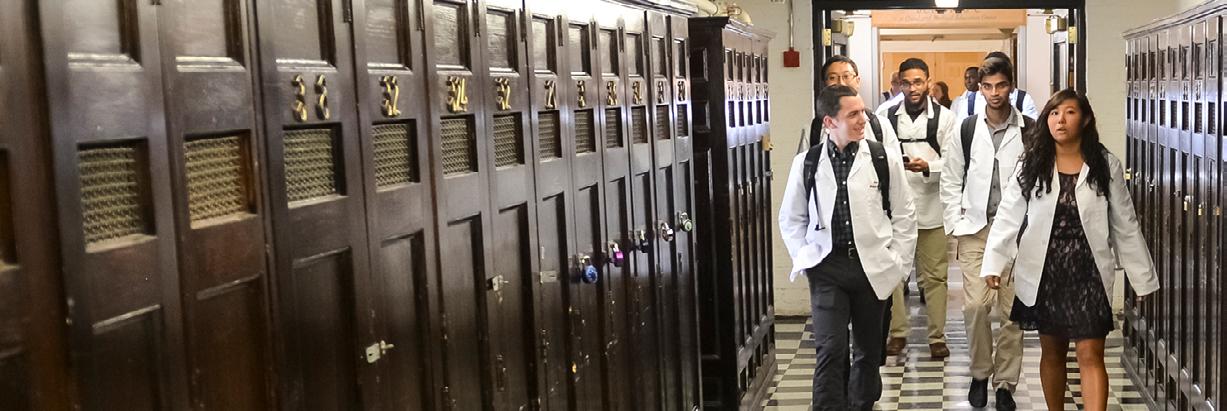
One of the greatest features of the Pathways curriculum is the opportunity for students to customize their route through Years III and IV to prepare optimally for whatever aspect of the profession of medicine has attracted their curiosity and passion. While rigorous demands and high expectations are set, the expanded time following PCE allows for considerable flexibility as students pursue advanced integrated science courses, clinical and non-clinical electives, and scholarly research projects.
The Pathways section of the HMS website has detailed information, including a curriculum map and the MD course catalog. Information on the most recent major changes to Pathways can be found in the November 2020 issue of AAMC’s Academic Medicine and in the AAMC 2020 supplement A Snapshot of Medical Student Education in the United States and Canada: Reports From 145 Schools
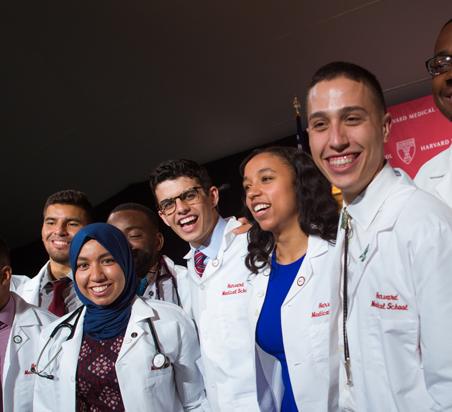
Beginning with the Pathways class of 2027 (students entering HMS in August 2023), the preclerkship calendar will include a summer break between Years 1 and 2, allowing students to pursue activities of their choice, such as getting an early start on research, completing community health or advocacy work, beginning medical education projects, or simply taking a wellness break. The revised academic calendar
also includes a dedicated period for USMLE Step 1 preparation and completion before the start of the Principal Clinical Experience. To learn more about these changes, please visit Pathways Curriculum Calendar Change
Championing curriculum reforms is perhaps the most important charge of the new DME, who will play a critical role in ensuring HMS is best positioned to educate physicians and physician-scientists in the short term and into the 2030s. For Pathways, the DME will engage students, faculty, and affiliates in a comprehensive initiative to design and implement a new clerkship model.
Each year 30 of the 165 first-year MD students are enrolled in the Harvard-MIT Program in Health Sciences and Technology (HST), an inter-institutional collaboration between Harvard University, Harvard Medical School, and MIT dedicated to fostering academic excellence, scientific rigor, and clinical expertise.
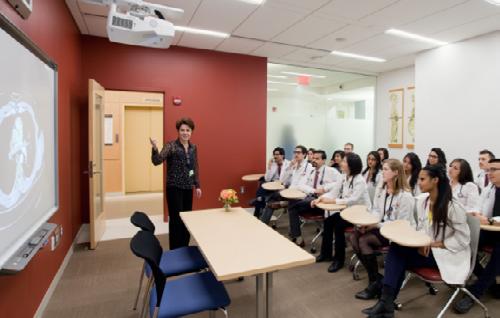
HST MD students have opportunities to collaborate with Harvard and MIT faculty drawn from across departments and disciplines to develop preventative, diagnostic, and therapeutic innovations. The research opportunities in HST are legion, spanning the entire academic landscape from Cambridge to Boston, and offering laboratory experiences in engineering, wetbench investigation, and computational research.
Growth of the Physician-Scientist is woven throughout the first preclerkship year and designed to address the specific challenges of a career that balances clinical medicine and research. All HST MD students are assigned to the London Society.
Beginning in April of the second year, HST MD students join their classmates from the Pathways MD track in clinical clerkships in the PCE. As in the Pathways curriculum, HST students are assigned to one of the following hospital affiliates: Beth Israel Deaconess Medical Center (BIDMC), Boston Children’s Hospital (BCH), Brigham and Women’s Hospital (BWH), Cambridge Health Alliance (CHA), or Massachusetts General Hospital (MGH) for the PCE; students at BIDMC and BWH complete the pediatrics clerkship at BCH.
During their last year of medical school, HST students are required to complete the Medicine II Subinternship and the clinical capstone, and submit a research-based thesis. They continue to build knowledge and skills in their area of interest through clinical electives and subinternships.
During the preclerkship phase HST MD students build a deep understanding of the medical sciences while exploring the human side of medical science by meeting with patients in classroom and clinical settings. There are also small group case-based exercises, problem-solving sessions, and laboratory experiences.
In addition, students conduct research at MIT or one of HMS’ affiliate teaching hospitals, building expertise and learning from a thriving community of researchers. An interconnected curriculum called the
Since its inception, courses in the HST MD track have been regularly updated, keeping the program at the forefront of innovations in medicine and science. However, even with the program’s continued success, there is interest in pursuing a complete evaluation and re-imagining of the curriculum; this will be another critical charge of the incoming DME, who partners with the Dean for Research Operations and the Director of HST in leading a comprehensive effort to position the HST curriculum as one of the world’s transformative degree programs for physician-scientists.
As part of Harvard University and as a key collaborator with MIT, HMS offers students numerous ways to customize their academic experience.
Many Harvard medical students opt to earn a combined MD/Master’s degree, finishing their studies in five years. In conjunction with HMS’ Office for Graduate Education, students can complete a Master of Academic Discipline (MAD) degree or a Master of Medical Science (MMSc) degree at HMS between the third and fourth years of medical school, following completion of the Principal Clinical Experience phase of the MD curriculum.
The dual MD-MAD degree is currently offered in Bioethics, Biomedical Informatics, Clinical Service Operations, Healthcare Quality and Safety, and Media, Medicine and Health.
The dual MD-MMSc degree is currently offered in Clinical Investigation, Global Health Delivery, Immunology, and Medical Education.
Medical students aspiring to become physician leaders can earn an MD-MBA in collaboration with Harvard Business School, while those with a passion for public health and preventive medicine can earn an MD-MPH through the Harvard T.H. Chan School of Public Health. Harvard’s John F. Kennedy School of Government affords an opportunity to earn the MD-MPP, which prepares students for positions of leadership in federal, state and local governments, international organizations, nonprofit institutions, large service delivery organizations, or research centers.
At the doctoral level there is an eight-year MD-PhD degree for physician scientists offered through the Harvard/MIT collaboration; in this program, MD students are admitted to either the Pathways or HST tract for their medical education. This program has been sponsored in part by the National Institutes of Health Medical Scientist Training Program since 1974. There are also a wide array of PhD programs offered in collaboration with Harvard’s integrated life sciences and social sciences. Also in collaboration with MIT, MD students can pursue combined doctoral studies through the Institute’s School of Engineering or School of Science.
The incoming DME will have the opportunity to explore a potential new curricular program for students dedicated to health care leadership and transformation.
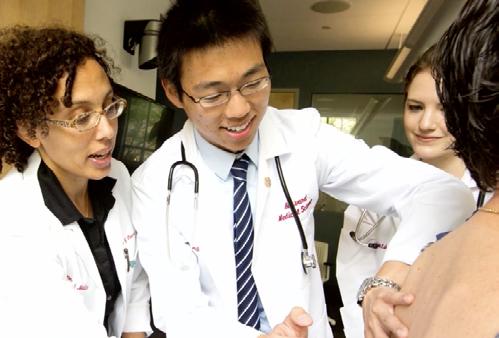
The Program in Medical Education (PME) provides services across planning and administration (admissions, registrar, finance, financial aid, scholarly engagement); student affairs (academic societies/ learning communities, learning resources, disability services); multicultural affairs, recruitment, and support; the office of medical education (faculty development, curriculum, assessment/evaluation, quality improvement); HST, MD-PhD, and other joint-degree programs; and affiliated hospital medical education programs.
Administrators and staff are passionate about their contributions to HMS and look forward to advancing the mission under the new DME, who will be charged with ensuring optimal performance and continuous quality improvement through inspirational, transparent, and responsive leadership.
This is a pivotal time to assume the deanship as the PME begins to chart its post-COVID future. While the pandemic created immense challenges to student education and operations, it also highlighted the PME’s ability to innovate and achieve results under the harshest circumstances. The incoming DME will have the opportunity to build upon this momentum and resilience.
In recent months HMS has increased its investment in its educational mission by adding three faculty positions in the PME. An Associate Dean for Faculty Development in Medical Education/Director of the Academy, appointed in 2021, oversees faculty development focused on the areas of classroom and clinical teaching, anti-racism, medical education
• Senior Associate Dean for Medical Education
• Associate Dean, Medical Education & Planning Administration
• Dean for Students
• Associate Dean, Student & Multicultural Affairs
• Faculty Associate Dean, Admissions
• Director, MD-PhD Program
• HMS Co-Director of HST
• Undergraduate Medical Education (UME) Associate Deans
scholarship, and educational quality improvement, as well as Academy Fellowships in medical education and research.
In addition, two part-time decanal positions have been added: an Associate Dean for Assessment and Evaluation and an Associate Dean for Curriculum; both appointments begin January 1, 2023.
With these three Associate Deans, the Senior Associate Dean for Medical Education will lead a new Office of Medical Education focused on curriculum, assessment and evaluation, faculty development, and educational quality improvement, combining the former offices of Curriculum Services and Educational Quality Improvement.
While every area and initiative of the PME is critical to the HMS mission, the most urgent for the incoming DME will be to strategically design and implement a program readying the institution for the 2026-2027 LCME accreditation process.
Additional efforts requiring immediate attention include continued advancement of a “core teaching faculty” model of financial support for clinician-educators across hospital affiliates; continued implementation of recommendations made by the PME Anti-Racism Task Force; and assessment/evaluation of issues surrounding the grading system.
Leading all aspects of the MD program, the Dean for Medical Education inspires faculty, staff, students, alumni, and others, providing the strategic oversight, planning, and implementation of medical student education at HMS. The DME serves as a member of the Dean’s Leadership Council, working with other HMS leaders to advance the school’s mission, and specifically to champion the preparation of a diverse group of students to become the next generation of leaders in all domains of medicine (in the US and around the world), committed to lifelong learning necessary to stay abreast of the ever-expanding scope of scientific and medical knowledge.
The DME represents the Program in Medical Education (PME) to other offices of HMS, Harvard University, HMS-affiliated hospitals, and national organizations involved in medical education and serves as HMS Faculty Accreditation Lead for the LCME. While optimizing the medical student education mission within the PME budget, the DME also serves as an important spokesperson to a variety of constituencies to expand resources for the medical education mission of HMS.
The DME oversees the selection of extraordinary medical students, faculty education leaders, and educational support staff, appointing course and clerkship directors, student advisors, and other key roles to ensure that HMS students are surrounded by role models who will inspire them to reach their highest potential.
The DME chairs the Educational Policy and Curriculum Committee and convenes the Associate Deans for Undergraduate Medical Education at HMS hospital affiliates that host the clerkships of the Principal Clinical Experience, ensuring both the highest standards of excellence and comparability of educational objectives and outcomes across all sites, along with all other LCME accreditation expectations.
This important leadership role ensures optimal performance and continuous quality improvement of a robust, matrixed operation that spans curricular oversight, student support, and other administrative and leadership functions.
Curriculum-related responsibilities include oversight and continuous improvement of the Office of Medical Education:
• Pathways/HST Preclerkship courses
• PCE clerkships
• Post-PCE courses and clerkships
• Societal/curricular themes
• Student assessment
• Faculty development, including the Academy
• Program evaluation
• Continuous quality improvement of the MD program
Student and faculty support responsibilities include oversight and continuous improvement of:
• Office of Student Affairs
• The Academic Societies (Cannon, Castle, Hinton, Holmes, London)
• Office of Recruitment and Multicultural Affairs
• Office of Scholarly Engagement
• Office of Learning Resources and Support
• Office of Disability Services
• PROGRESS: Professional Growth and Educational Support System
• MD-PhD and other joint-degree programs
Other administrative and leadership responsibilities include:
• Oversight and continuous improvement of the PME Administrative Offices:
• Admissions
• Financial aid
• Registrar’s office
• Anatomical gift program
• PME finance
• Chairing the Educational Policy and Curriculum Committee and PME Executive Committee
• Serving as a voting or ex-officio member of numerous other PME committees, including all curricular phase and track committees
• Serving as a voting or ex-officio member of numerous other HMS committees, including the MD-PhD and MD-MBA Steering Committees, Promotion and Review Board, Alumni Council, and Learning Environment Committee
• Staffing the Dean’s Advisory Council on Education (ACE) and advocating for financial aid and educationalprogram resources
• Representing HMS to the AAMC, LCME, AMA, Thirteen School Consortium, and other national organizations
In leading the administrative functions of the PME to ensure operational excellence, the DME is responsible for ensuring that the correct skills, talent, and capacities exist within these offices of the PME. Students and teaching faculty alike expect and deserve outstanding and efficient administrative service in supporting the medical student education mission of HMS.
• Continued work to implement a “core teaching faculty” model of financial support for clinician-educators in collaboration with the hospital affiliates, collaborating as well with the Office for Faculty Affairs on mechanisms to support their scholarship and their academic promotion
• Reinforcement of the expectation that appointment as a Harvard faculty member at an affiliated institution comes with a responsibility for and commitment to teaching of medical students—a role that appears to be threatened by the corporate direction and patient-deliverable volumes of expanding health care networks
• Successful design and launch of a new HST curriculum
• Successful design and launch of a new clerkship model
• Continued exploration of a potential new curricular program for students dedicated to health care leadership and transformation
• Reconsideration of assessment/grading system to reinforce and reward achievement of excellence
• Commitment to partnering with learners and faculty to foster a work and learning environment that nurtures personal-professional development and resilience in our students
• As Faculty Accreditation Lead, guide HMS successfully through the next LCME self-study and site visit
• Continued progress on implementation of the recommendations of the PME Anti-Racism Task Force and the continued priority of diversity, equity, and inclusion in medical education and medicine
• Continued progress on quality, efficiency, collaboration, and effectiveness across the administrative support functions of the PME
Priorities for the DME that will define success over the coming years:
• M.D. degree
• Academic rank of Associate Professor or Professor (the latter being preferred)
• Established record of academic accomplishment in medical education, including a strong national reputation as an educator, innovator, and published scholar in undergraduate medical education
• 10+ years of administrative, managerial, budgetary experience in a complex, matrixed organization
• Dedication to the medical student education mission
• Experience in and in-depth knowledge of national trends in curricular innovation, medical student assessment, curriculum development and pedagogy, program evaluation and educational quality improvement, and clinical teaching in a changing health care landscape
• Familiarity with affiliate hospital relationships and sensitivity to the impact on the academic mission of the expansion of hospital networks
• Clinical productivity pressures on hospital-based faculty resulting from changes in hospital practice patterns and system consolidation
• Parallel research productivity pressures on research faculty
• Demonstrated dedication to faculty development of the teaching faculty
• Leadership experience in medical school accreditation
• Demonstrated commitment to fostering a diverse, equitable, and inclusive culture
• Extensive teaching and mentoring experience and excellence
• Established record as a highly ethical, authentic, clear communicator, committed to excellence, impeccable standards, transparency, and the fostering of effective interfacing with students, faculty, staff, medical school and hospital leaders, and external constituencies
• Exemplary experience in building collaborative relationships, leading inclusive teams, engendering trust, and serving as a role model for students in the MD program
• Outstanding personal qualities of intellect, judgment, dedication, diplomacy, honesty, candor, empathy, confidentiality, sensitivity, responsiveness, dependability, accessibility, and trustworthiness
•
Harvard Medical School has retained Exceptional Executive Search to assist with this national search.
Nominations, inquiries, and applications (including CV and letter of interest) should be directed in confidence to: Nicole Gakidis, Exceptional Executive Search, at hms@eesrecruit.com.

Harvard Medical School is an equal opportunity employer and all qualified applicants will receive consideration for employment without regard to race, color, religion, sex, national origin, disability status, protected veteran status, gender identity, sexual orientation, pregnancy and pregnancy-related conditions or any other characteristic protected by law.
View HMS Diversity Statement
Harvard Medical School’s Longwood campus is in the heart of one of the nation’s most vibrant cities. Boston’s unique charm and character emerges from its central role in American history and the easy access it offers to a cosmopolitan abundance of personal, social, and professional opportunities.
With over 40 colleges in the area and an intellectual tradition that has resulted in the emergence of many of the nation’s most influential religious, philosophical, and political movements, Boston offers HMS students a wealth of academic resources. Biotech research also has a formidable presence in the neighborhood alongside HMS’ own renowned research presence.
The HMS campus is located across the Charles River from Harvard University’s Cambridge campus. The travel distance between HMS and Harvard University is minimal with many public transportation options bridging the two campuses. Take the Virtual Campus Tour
Boston is one of the most walkable cities in the nation. Planned with pedestrians in mind, our city boasts short distances between amenities, pedestrian-friendly walking routes, and a wealth of greenways, including:
• Charles River Esplanade
• Rose Kennedy Greenway
• Southwest Corridor Parkway (less than 15 minutes on foot from campus)
• Historic 1,100-acre Emerald Necklace (just a five-minute walk from campus)
Located in the heart of Boston’s Longwood Medical Area, Harvard Medical School is also a short walk from venues of entertainment and the arts:
• Fenway Park, home of the Boston Red Sox
• Museum of Fine Arts (HMS students, faculty, and staff get free ticketed admission using their University IDs)
• Isabella Stewart Gardner Museum (HMS students get free admission using their University IDs; discounted tickets are available for faculty and staff)
In addition, Harvard Medical School is just minutes away from seven of our affiliated hospitals, and a number of hotels, restaurants, bars, shops, colleges and universities, places of worship, banks, and many opportunities for recreation and entertainment.
Source: HMS Life in Boston
